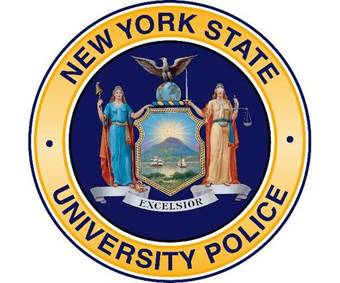SUNY, UAlbany Form Advisory Committee to Evaluate Campus Police Practices and Policies
ALBANY, N.Y. (June 11, 2015) -- The State University of New York University Police, in concert with the School of Criminal Justice at the University at Albany, today announced the formation of an Academic Advisory Committee to assist the SUNY University Police in evaluating emerging policies and practices related to law enforcement for the university system.
Police Commissioner R. Bruce McBride said that this is an exciting undertaking in terms of improving University law enforcement services to the SUNY community, especially in light of national police issues related to the use of force and interactions between police and community members.
 |
|
UAlbany's School of Criminal Justice is partnering with the SUNY University Police to develop an academic advisory committee designed to help evaluate emerging policies and practices related to law enforcement for the university system.
|
It is an honor and a great opportunity to have a platform for the Committee to share their experiences and research, said Commissioner McBride. As we provide law enforcement services to academic communities on SUNY campuses across New York State, it is only fitting that we partner with our academic colleagues to further our mission of public safety and security.
Members of the Committee include faculty from the University at Albany's nationally ranked School of Criminal Justice -- James Acker, David Bayley (Ret.), and Robert Worden, all experts in community policing.
Joining the academics are State University Chiefs of Police J. Frank Wiley of UAlbany, Tim Faughnan of Binghamton University, Gerald Schoenle of the University at Buffalo, Stony Brook University's Robert Lenahan, and Deputy Commissioner Paul Berger of the SUNY University Police. McBride anticipates that the advisory committee will grow to include other members and academics.
Academic Backgrounds
James Acker, who holds a doctorate and law degree from Duke University, studies the integration of social science into law, and legal doctrine relating to criminal procedure, juvenile justice, and capital punishment. He has authored and co-edited numerous books and studies, including America's Experiment with Capital Punishment: Reflections on the Past, Present and Future of the Ultimate Penal Sanction (Carolina Academic Press); Wrongful Conviction: Law, Science, and Policy (Carolina Academic Press); and (with his daughter Elizabeth) Two Voices on the Legal Rights of America’s Youth (Wadsworth/Thomson Learning).
David Bayley (Ret.) is currently a member of the UN's International Police Advisory Committee and its Global Police Policy Community advisory group. He specializes in international criminal justice and policing, with extensive research in India, Japan, Australia, Canada, Britain, Singapore, and the United States. His career work has concentrated on police reform, accountability, foreign assistance to police agencies, and crime-prevention strategies. Bayley served as a consultant to the U.S. government and the United Nations on police reform in Bosnia, and was a member of the international Oversight Commission for the reform of the police of Northern Ireland 2000-2007.
Robert Worden’s research and teaching focuses on criminal justice administration and policy, and revolves around questions of the accountability and responsiveness of criminal justice institutions to the public. He is currently examining concerns police legitimacy, procedural justice, and accountability, and police misconduct and citizen oversight of the police. Worden’s research has been funded by the National Institute of Justice, the Bureau of Justice Assistance, the New York State Division of Criminal Justice Services, and local governments. Previously, he served on the National Research Council’s Committee to Review Research on Police Policies and Practices, whose report, Fairness and Effectiveness in Policing: The Evidence, was published by the National Academies Press. He has also served on the City of Albany’s Gun Violence Task Force.
About the SUNY University Police
At this time, the State University has 610 University Police officers assigned to 28 State operated campuses. Operations are coordinated through the Office of the Commissioner, located at System Administration in Albany. Sworn officers are trained according to standards promulgated by the State University, the New York State Division of Criminal Justice Services and the New York State Department of Civil Service.
![]() For more news, subscribe to UAlbany's RSS headline feeds
For more news, subscribe to UAlbany's RSS headline feeds
A comprehensive public research university, the University at Albany-SUNY offers more than 120 undergraduate majors and minors and 125 master's, doctoral and graduate certificate programs. UAlbany is a leader among all New York State colleges and universities in such diverse fields as atmospheric and environmental sciences, business, education, public health,health sciences, criminal justice, emergency preparedness, engineering and applied sciences, informatics, public administration, social welfare and sociology, taught by an extensive roster of faculty experts. It also offers expanded academic and research opportunities for students through an affiliation with Albany Law School. With a curriculum enhanced by 600 study-abroad opportunities, UAlbany launches great careers.


